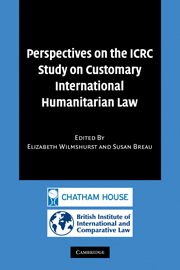Book contents
- Frontmatter
- Contents
- Preface
- List of contributors
- Table of cases
- Table of treaties and other instruments
- Abbreviations
- Part 1 Setting the scene: Theoretical perspectives on international law in the ICRC Study
- Part 2 The status of conflict and combatants: The ICRC Study
- Part 3 Commentary on selected Rules from the ICRC Study
- Part 4 Conclusions
- 16 Conclusions
- Index
16 - Conclusions
Published online by Cambridge University Press: 09 July 2009
- Frontmatter
- Contents
- Preface
- List of contributors
- Table of cases
- Table of treaties and other instruments
- Abbreviations
- Part 1 Setting the scene: Theoretical perspectives on international law in the ICRC Study
- Part 2 The status of conflict and combatants: The ICRC Study
- Part 3 Commentary on selected Rules from the ICRC Study
- Part 4 Conclusions
- 16 Conclusions
- Index
Summary
The invitation given by Dr Yves Sandoz in his foreword to the Study to read, discuss and comment upon its contents has been taken up with enthusiasm by the contributors to this book. They have written from their personal perspectives, relying on their different areas of expertise; in commenting on the Rules they have put the law into its historical context and added to the discussion about application and implementation of the law. They have welcomed the Study as a very valuable resource, while identifying various issues as deserving of further consideration by both the authors and the readers of the Study. These issues concern both the methodology used by the Study and the Rules themselves.
The methodology
The Study gives fresh impetus to the debate about the nature of customary international law and the manner of its formation. Some of the issues the authors of the Study had to grapple with apply to any attempt to ascertain custom: what is the relevant State practice, when can practice in relation to treaties be regarded as evidence of custom, what evidence is available for opinio iuris and is there always a need to seek it? Because so much of international humanitarian law is regulated by treaty, the second of these issues is particularly relevant. There are other issues relating solely to the assessment of custom for the purpose of international humanitarian law.
- Type
- Chapter
- Information
- Publisher: Cambridge University PressPrint publication year: 2007

